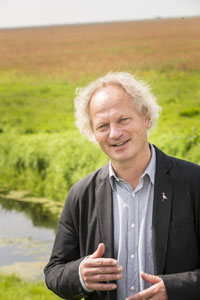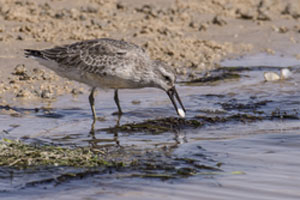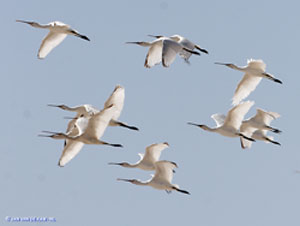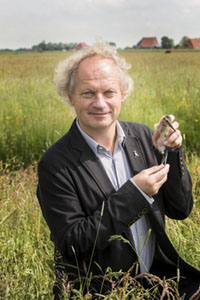Spinoza Prize winner: ‘I embrace the fuzzy nature of ecology’
Theunis Piersma, professor of Global Flyway Ecology at the University of Groningen, has been awarded a Spinoza Prize. The Netherlands Organisation for Scientific Research (NWO) announced this today.

Piersma is free to spend the prize, € 2.5 million, on any part of his research he wants: ‘There’s much more to migratory birds than just a genome. They have an incredible ability to adapt to their demanding way of life and changes to their environment. We want to understand the interaction between that flexibility and the environments in which they grow up.’
Theunis Piersma is not only professor in Groningen, he is also a senior Wadden researcher at the NIOZ, the Royal Netherlands Institute for Sea Research.
Choices
Migratory birds do very complicated things. They travel the world in fascinating ways. And they make choices. As the seasons pass, they not only select their stopping places but also the times when they move from one place to another, which is often thousands of kilometres away. Making a mistake could cost them their lives.
Flexibility problem
The wide range of species in nature, biodiversity, is under great pressure. In a world dominated by humans, those species able to adapt to quick changes are the ones with the best chance of survival. So what is behind the ability to adapt? Migratory birds embody that part of the biodiversity that links our country with a large part of the rest of the world. They are a good model for investigating the flexibility problem.
Fuzzy
In a short film on the University of Groningen website, Theunis Piersma says that for the last 50 years the emphasis in biological research has been too much on the role of genes, and that the role played by the environment – even in ecology – has been underestimated. This mainly hard scientific approach has its limitations because: ‘Ecology is much more fuzzy-edged. I really enjoy embracing the fuzzy nature of it and then discovering the wider picture’, says Piersma.
Followed for life
‘We don’t know much yet about how the lifetimes of birds and migratory birds take shape. There are definitely hereditary aspects to migration, but throughout their lives birds also learn a lot from each other, and they make their own observations. For example, they react to the circumstances they encounter during their journeys. Technological developments, for example ever-smaller transmitters and new satellite and internet technology, now make it possible to follow individual birds or migratory birds throughout their lives.
Childhood experiences
Do young birds accompanied by older birds on their first migration south do better than young birds who are too late to profit from the experience of older birds? Piersma’s ambition is to first interpret migratory behaviour in terms of the interaction between hereditary information and contextual information (about food availability, natural enemies and routines learned from parents and other birds of the same species). To what extent do childhood experiences – and thus not hereditary disposition – determine later migration routines? To what extent are migratory birds able to cope with the massive loss of habitat and the swift climate changes they are exposed to? Is their evolutionary flexibility the result of their ability to learn? And finally, why does one species or individual find it much easier to adapt to environmental changes than another?
Iconic
‘We will concentrate on three iconic Dutch species – knots, spoonbills and black-tailed godwits – so we can build on a lot of essential basic knowledge. We have been registering these species for years and closely observing their habitats in the Netherlands and along their migration routes’, says the winner of the Spinoza Prize.
Curriculum Vitae
Theunis Piersma (1958) is professor in the Centre for Ecological and Evolutionary Studies (CEES) of the University of Groningen. He studied biology in Groningen, and lead his first research expedition, to Mauretania, in 1980 while still a student. In 1994 he gained his PhD from the same university. Since then he has worked as a researcher both at the University of Groningen and at the NIOZ Royal Netherlands Institute for Sea Research. He was appointed professor of Animal Ecology in 2003. He exchanged this chair for the new chair in Global Flyway Ecology in 2012, sponsored by a collaboration between the University of Groningen, the Worldwide Fund for Nature and Vogelbescherming. He has been a member of the Royal Netherlands Academy of Arts and Sciences (KNAW) since 2009.
More news
-
26 February 2026
Vici grant for Professor of Neurology Marieke Wermer
-
26 February 2026
What can the law do for women? Join International Women’s Week!
-
17 February 2026
From Ghostbuster to Disaster Researcher
